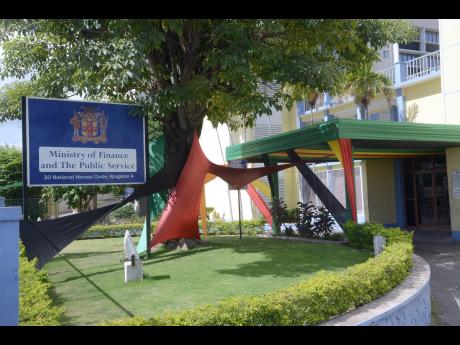It’s now 21 years since bailout agency Finsac was established to address problems of insolvency in the financial sector, but plans to wind up the company are hostage to unresolved court cases.
The Ministry of Finance told the Financial Gleaner that it cannot deregister the Financial Sector Adjustment Company Limited until the lawsuits are resolved.
The most recent fiscal policy paper for 2018/19 indicates that one of these matters is a $1-billion claim against Paul Chen Young of the defunct Eagle Merchant Bank.
Finsac was established in 1997 to intervene in the financial sector, owing to the widespread liquidity and insolvency problems that engulfed the sector at the time. The finance ministry said its subsidiary, Financial Institutions Services Limited, has been working to wind up of residual activities on behalf of Finsac, including disposal of the remaining properties under its control.
“Finsac is a party to several matters that remain before the courts and therefore Finsac cannot be deregistered until these issues are fully resolved,” said acting Financial Secretary on August 3.
“The MOF is not in control of the time it will take for litigation to be settled by the courts. Furthermore, Finsac has assets for which sale transactions need to be completed before deregistration,” Morrison.
Steps to deregistration include but are not limited to resolution of matters before the courts and completion of sale assets on remaining transactions of assets held.
The outstanding matters were not listed by Morrison but they are itemised in the fiscal policy paper. The Eagle court case, for example, was decided against Finsac, which was ordered to pay damages of $15 million plus interest compounded monthly since October 1992. The decision was appealed and that case was heard in 2016. That judgment is pending.
Another is the case in which the Privy Council handed down a judgment of about $3 billion, plus interest, against Donovan Crawford in 2005 in litigation regarding Century National Bank. Since then, various Crawford-owned/related properties were sold to reduce the debt including the sale of one property in July 2017, which netted $8.4 million. There are two properties remaining to be sold with estimated value of $8 million, the fiscal policy paper outlined.
In another Eagle/Chen-Young related case, judgement of $1 billion was handed down in May 2006 in favour of Finsac. Chen Young appealed the judgment and also brought a suit of bias, claiming undue influence at the trial. Both matters were heard in late 2013. Due to delays and other setbacks, Dr Chen Young filed a motion in October 2017 for a new hearing of the appeal to be scheduled before new judges.
The Appeal Court has heard Chen Young’s latest application and should have made its decision before the end of March 2018.
Chen Young also sued Finsac in the Miami-Dade County Court claiming US$3 million “in attempts to collect under the judgment it received in the local court,” the fiscal paper said.
Other unresolved issues, outside of the court system, include ongoing talks with administrators Guardian Life Limited, actuaries at Eckler, and regulator Financial Services Commission on outstanding pension-related matters.
The Finance Ministry said that the book value of assets held by Finsac at March 2016 was estimated $1.163 billion, but did not indicate the value at present date.
In April of this year, Finsac general manager Errol Campbell told the Financial Gleaner that the remaining assets r included shares in Ciboney Limited and two lots of land
Finsac is about to retender the Ciboney shares after a deal with an unnamed buyer fell through last month.
Last year, Finsac sold several properties including: a Mutual Life warehouse complex in Kingston, which netted $73 million; a 17-acre beachfront property at Culloden, Westmoreland that was held by Ciboney which netted US$1.8 million; one of four half-acre lots at Drax Hall, St Ann, $7.6 million, while sale agreements for the other three are projected to net another $15 million.
In addition to the real estate transactions, Finsac collected $2.4 million from share sales, while another $23 million is anticipated for shares that were in the process of being sold.
Sometime after its formation, Finsac sold its bad debt portfolio and the distressed assets are being disposed of by Jamaica Redevelopment Foundation Inc. However, the number of properties still to be sold is unknown as JRF head Jason Rudd has not responded to requests for comment.
As to the remaining Finsac assets, Morrison said no one was interested in buying them en bloc as far as the ministry knew, “though entities have expressed interest in various assets,” she added. The ministry described the Finsac assets as “shareholdings in various companies and properties”.
A commission of enquiry was launched into Finsac in 2009, but the report from the commissioners remains outstanding. In June 2017, the government disclosed that Cabinet had approved a write-off of debt owed to Finsac amounting to $106.2 billion.




Leave A Comment